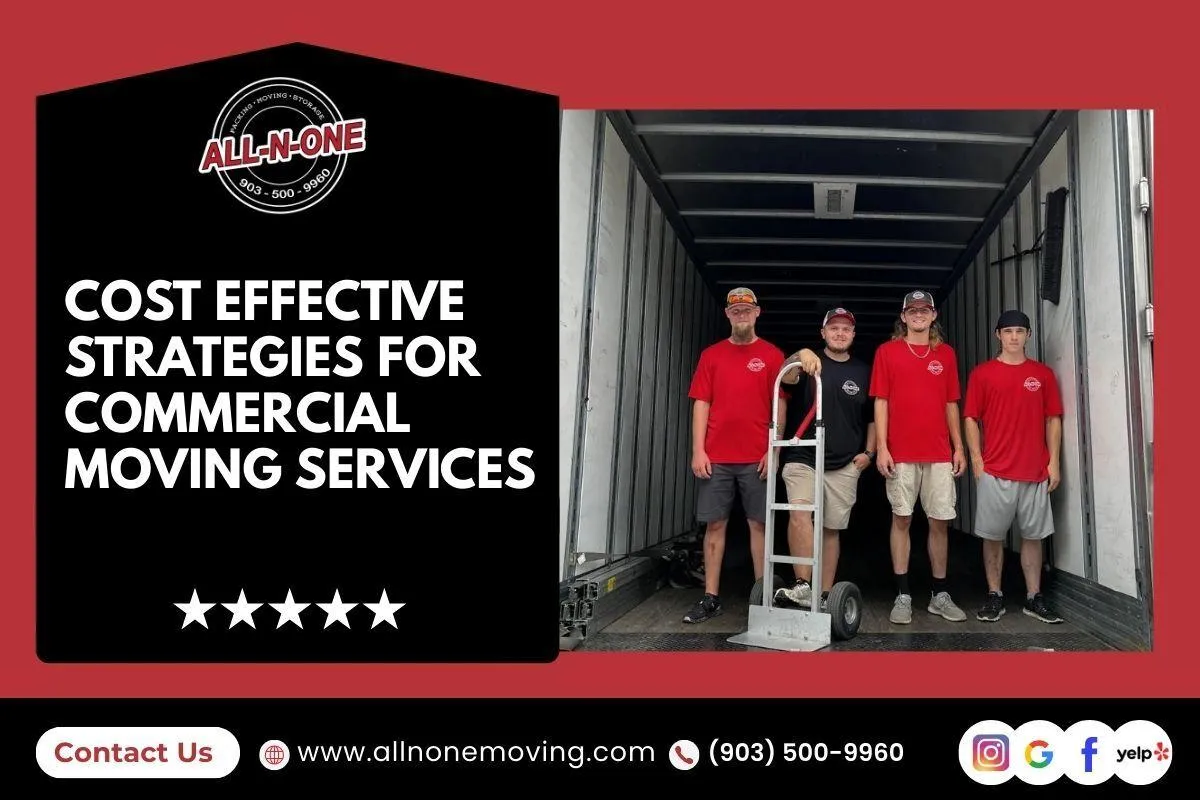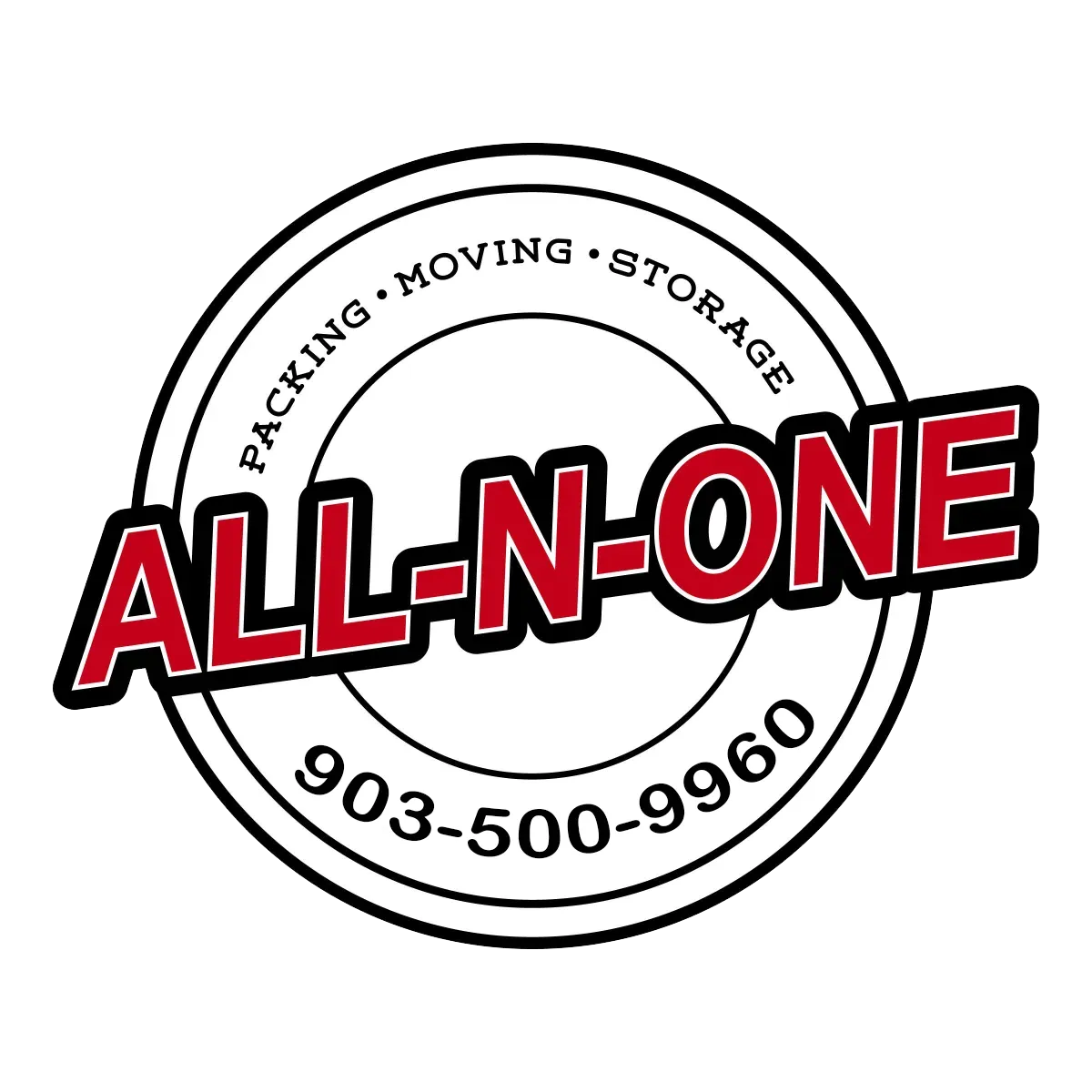OUR BLOGS
All-N-One Moving is your trusted partner in the moving process. So, if you’re planning a move, be sure to check out our blogs for valuable insights and tips to make your move a success.
Articles

Cost-Effective Strategies for Commercial Moving Services
When business growth calls for relocation, it’s exciting, yet the task of moving can feel overwhelming. Expanding into a larger space or shifting to a new location comes with numerous decisions and logistical challenges, but budget management is often the most critical factor. Unexpected costs can derail even the most well-planned moves.
This guide aims to provide straightforward, actionable strategies to help you move your business efficiently while keeping costs in check. From planning ahead to choosing the right services, these tips will ensure your move is smooth, hassle-free, and within budget.
Relocating doesn’t have to drain your resources. By following the right steps, your business can thrive in its new space without unnecessary expenses. Let’s dive into cost-effective approaches that deliver results.

What Is a Commercial Move and How Does It Differ from a Residential One?
A commercial move involves relocating a business, office, or any other commercial space. Unlike residential moves, which typically involve personal belongings, a commercial move focuses on equipment, office furniture, inventory, and sometimes, sensitive data or machinery.
The scale of a commercial move is often much larger, with more items that require specialized handling. Businesses often move office furniture, computers, servers, and other equipment that need careful packing and transportation. Specialized equipment or machinery might also need extra coordination and care.
Minimizing downtime is a key goal in commercial moves. Unlike residential moves, where the main concern is getting settled into a new home, businesses aim to reduce operational disruptions. This requires effective coordination with employees, IT teams, and building management at both locations to ensure a seamless transition without affecting business operations.
Why Is a Detailed Moving Budget So Important for Your Business?
A detailed moving budget is your essential roadmap for a cost-efficient relocation. It prevents overspending by outlining financial limits, allowing you to make informed decisions on which services to prioritize.
What Key Factors Influence Your Commercial Moving Costs?
Volume & Weight
More items and heavier loads increase the overall cost due to the extra time and effort required to move them.
Distance
Longer moves typically cost more, as they involve additional fuel, travel time, and potentially overnight stays.
Timing
Peak moving seasons, such as weekends and summer months, tend to raise prices. Moving during off-peak periods, such as weekdays in the fall or winter, can lead to lower costs.
Additional Services
Extra services, such as packing, unpacking, furniture disassembly/reassembly, and specialized handling for IT equipment, can all add to the cost of the move.
How Can You Get an Accurate Commercial Moving Cost Estimate?
To build a reliable moving budget, you need an accurate estimate. The single most important step is to ensure the moving company conducts a visual survey of your inventory.
Insist on an In-Person or Video Survey
Never rely on a quote given solely over the phone or via email. A reputable estimator must see your space to account for everything.Be Thorough During the Walk-Through
Don't just show them the main office. Open every closet, storage room, and server room. Point out any high-value, fragile, or specialized equipment that will need extra care.Ask About the Estimate Type
Confirm if the quote is binding (a firm, final price) or based on an estimated weight/volume (which can change slightly). A visual survey is the basis for both, but a binding estimate protects you from price increases.Get Everything in Writing
A precise, written estimate should detail all costs and services included. This is your best defense against hidden fees and surprise charges on moving day.
How Can You Lower Costs Before the Movers Even Arrive?
Most of your savings occur before moving day. Proactive steps such as early planning and decluttering can help you make better decisions, saving money while reducing stress.
The Financial Perks of Planning Your Move in Advance
Booking movers early locks in lower rates and provides time to prepare for the move. Early planning also reduces rushed, expensive decisions and allows you to get organized.
Lock in better rates
Booking movers 2-3 months ahead often secures discounted rates, especially during peak moving periods.More time to organize
With time to spare, you can organize your items and decide which services to prioritize.Avoid rush fees
Planning ahead reduces last-minute service requests, preventing costly rush fees.Improved flexibility
Early planning gives you time to adapt to any changes without disrupting your budget.
Decluttering Your Office: What Should You Keep, Donate, or Discard?
Decluttering is an effective cost-saving strategy for your move. The fewer items you move, the less you pay. A strategic approach can help you trim unnecessary costs.
Keep essential items
Retain critical documents, active inventory, and functional furniture that your business needs to operate efficiently.Donate or sell
Donate outdated furniture or electronics still in good condition, or sell them to reduce moving volume.Discard or recycle
Throw away broken items, shred old paperwork, and dispose of accumulated junk that no longer serves a purpose.Downsize your storage
A streamlined inventory reduces the number of boxes, cutting down moving costs significantly.
Packing In-House vs. Hiring Professionals: What's the Difference in Cost?
Packing can significantly impact your move's overall cost. Deciding between packing in-house or hiring professionals depends on your office's needs and budget.
DIY packing
Packing in-house saves money, especially if you're moving non-fragile items. However, it can lead to lost productivity as employees handle the packing.Risk of damage
Without proper packing materials or expertise, DIY packing increases the likelihood of damaged items, which can lead to additional costs.Professional packing
Hiring experts ensures fragile items, electronics, and furniture are packed safely. It also reduces potential downtime caused by improper handling.Hybrid approach
Consider a mix let employees pack personal items while professionals manage more sensitive or large equipment.
What Are the Most Cost-Effective Moving Options on Moving Day?
Moving day presents an opportunity to save money with the right approach. A few simple strategies can help keep costs down and ensure your move runs efficiently.
Strategy 1: Choose the Right Moving Partner
Cheapest quotes don’t always guarantee the best value. Opting for a reliable moving company is crucial to prevent costly delays, damages, and unnecessary stress. A trusted mover offers more than just affordable pricing.
Check for licenses and insurance
Ensure the mover is licensed and insured to avoid potential damage or theft of property.
Read reviews
Prioritize companies with strong customer reviews that highlight reliability and service quality.
Experience matters
Choose movers with experience in commercial relocations to ensure proper handling of equipment and furniture.
Get a detailed contract
Review the terms, including any additional fees, to avoid surprises later.
Strategy 2: Schedule Your Move During the Off-Season
Scheduling your move at the right time can significantly lower costs. Moving during peak periods, such as weekends or summer months, often leads to inflated rates.
Mid-week moves
Opt for Tuesday or Wednesday moves for the most affordable rates, as moving companies have less demand during the week.
Off-peak months
Schedule your move in fall or winter when moving companies generally offer lower prices than during the busy summer months.
Book well in advance
Plan ahead to take advantage of discounts and ensure your preferred moving date.
Strategy 3: Prepare Your New and Old Spaces
Preparing both locations can lead to significant savings on moving day. Simple actions to organize the spaces ahead of time will help move things along faster and more efficiently.
Book elevators
If your building has elevators, book them ahead of time to avoid wasting time and prevent delays.
Clear pathways
Remove obstacles from hallways, doorways, and stairs to speed up the loading and unloading process.
Organize your items
Ensure everything is packed and ready to go before the movers arrive, reducing time spent on handling unprepared items.
What Common Mistakes Should You Avoid to Prevent Hidden Costs?
Moving a business involves many decisions, and making the wrong choices can lead to unexpected expenses. Avoiding common mistakes during the moving process ensures a smoother, cost-effective transition.
Mistake 1: Not Understanding Your Insurance Coverage
Many moving companies include basic liability coverage, but it’s usually minimal. Full-value protection is a more comprehensive option, covering the actual value of damaged or lost items. Understanding the differences ensures you select the right coverage for your move.
Mistake 2: Forgetting to Notify Stakeholders
Failing to inform employees, clients, and suppliers of your move can cause unnecessary disruptions. Notify everyone well in advance to ensure that operations run smoothly and no important tasks are delayed.
Mistake 3: Overlooking IT Relocation Needs
IT equipment needs careful handling. Without proper preparation, you risk costly downtime. Work with professionals who specialize in relocating sensitive technology to avoid damaging valuable assets and causing delays in business operations.
Making Your Commercial Move Work for Your Budget
Efficient planning, decluttering, and selecting the right moving partner are essential steps for a cost-effective commercial move. By preparing well, businesses can reduce unnecessary expenses and avoid disruptions. A smooth relocation benefits not only the budget but also long-term business operations.
Investing in the right strategies today sets your business up for success in its new space, without the added stress of unexpected costs.
Ready to plan your stress-free and affordable office move? Contact us today for a free, no-obligation estimate! Let us handle the details so you can focus on what matters most to your business.

FAQs
1. How early should I start planning my commercial move?
Start planning 2-3 months in advance to secure better rates, avoid last-minute rush, and ensure everything is organized for a smooth transition.
2. What factors impact the cost of a commercial move?
Key factors include the volume and weight of items, distance, timing of the move, and additional services like packing or disassembly.
3. How can I minimize downtime during a commercial move?
Proper planning, early notification to employees and clients, and hiring experienced movers who specialize in commercial relocations can help minimize downtime.
4. Is insurance necessary for a commercial move?
Yes, commercial moves should include insurance. Basic liability coverage is minimal, so consider opting for full-value protection to ensure your items are fully covered.
5. Can I pack my office equipment myself to save costs?
Packing in-house can save money but may lead to damaged items or loss of productivity. A hybrid approach letting professionals handle fragile or sensitive items is usually best.
Claim Your Quote Here
About Us
All-N-One Moving is a professional moving company that specializes in stress-free local and long-distance moves. Our packing and moving services give us the ability to move you anywhere in the United States.
Tx Dmv# 10187767C
Contact us
Address:
4138 HWY 259 Longview Tx 75605
Serving Address:
Marshall, TX · Tyler, TX · Longview, TX, Gilmer, TX · Henderson, TX, US
Call us: (903) 500-9960
Email us:
Hours: Monday-Sunday
8:00AM - 6:00PM
Copyright © 2025 All-N-One Moving | All Rights Reserved | Made with ❤️by The Revive Agency.




